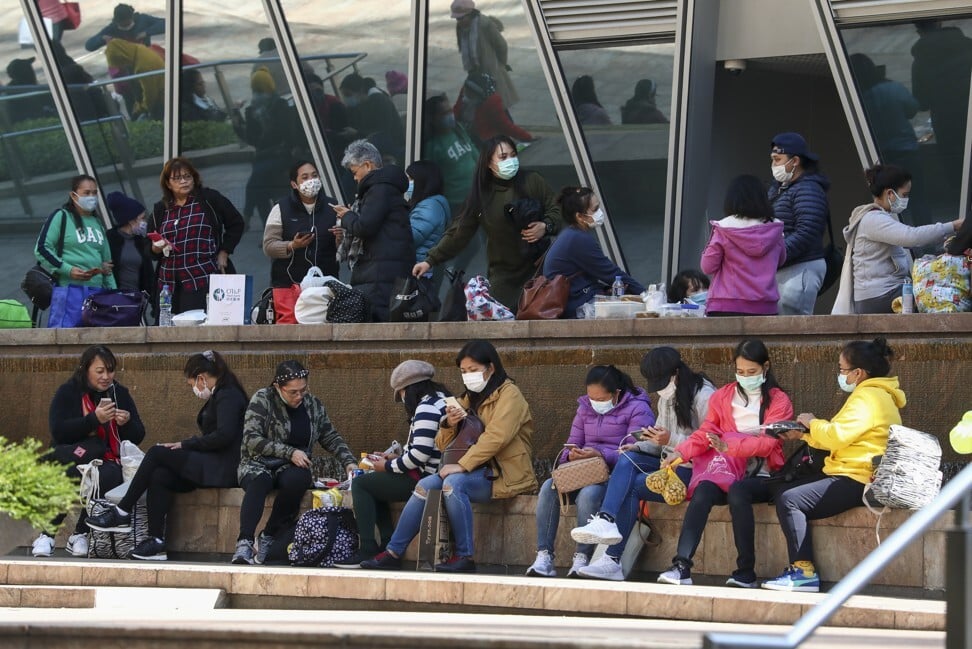
Hong Kong should take a leaf from Singapore’s alternative to live-in rule for domestic workers
- A Singapore scheme that allows some helpers to be hired by companies instead of household employers offers these workers greater flexibility and labour rights
- Hong Kong should model such an approach. Instead of forcing domestic workers to live with their bosses, both parties should be able to reach an agreement that suits them best
Under the programme, which was launched about five years ago but only became permanent in September, women from Myanmar, Sri Lanka, India, Thailand and Cambodia are hired and housed by companies. These firms then assign part-time duties in different households, including cleaning.
Women previously interviewed by This Week in Asia said the scheme meant better pay, more regular working hours, enhanced labour rights, and increased freedom. The programme, however, is far from perfect and does not allow workers to change jobs or look after children and the elderly.
Could this scheme put an end to ‘live-in’ rule for domestic workers?
Hong Kong should look into this example and take it further. Advocates have long supported the idea of allowing migrant workers and employers to choose an arrangement that works the best for both parties, instead of having to comply with a mandatory live-in rule.
This policy, which has been strictly enforced in Hong Kong since April 2003, has further exposed domestic workers to different forms of abuse, including physical violence, having to sleep in cupboards, and being on call for 24 hours.
The unequal power structures of the employer and employee have been mentioned as a fundamental reason for the increased vulnerability of domestic workers when forced to live and work at their employment residence, said Manisha Wijesinghe, executive director of the support group HELP for Domestic Workers.
But such imbalance has become even more troubling over the past two years, during which migrant domestic workers have had to share close quarters with their employers, who themselves were working and studying from home due to the Covid-19 pandemic.
“This has led to longer working hours and added job-related stress among the domestic worker community,” Wijesinghe said.
A survey conducted last year by Médecins Sans Frontières and the local charity Uplifters showed that 72 per cent of the foreign domestic workers interviewed in Hong Kong had experienced depression-related symptoms during the pandemic. There are about 370,000 migrant domestic workers, mostly women from the Philippines and Indonesia.
Wijesinghe said that while workers bore the brunt of the inequalities and difficulties created by the mandatory live-in policy, HELP had also seen that many employers were supportive of an opt-in live-in policy, where domestic workers and employers would be free to reach an agreement.
“Given Hong Kong’s compact living spaces, employers [could] too enjoy the option of deciding whether they want to share their personal space with someone outside of their family unit,” she said. “This would also allow those employers who do require live-in domestic workers to employ domestic workers who are willing and able to do so.”
Hong Kong’s unethical treatment of migrant workers tested in online challenge
Arguments for an opt-in policy have been clearly laid out in the previous judicial review applications to challenge the policy. But in September last year, a Hong Kong court ruled to uphold the compulsory live-in law, after government lawyers argued that allowing domestic workers to live on their own could have negative consequences, including pressure on the housing market.
Greater flexibility for both domestic workers and employers should instead be seen as an opportunity. The right for domestic workers to change jobs, receive greater protection under labour laws, and discuss their living quarters should be introduced in Hong Kong.
If the government considers such changes too risky, Hong Kong can at least test possibilities through a pilot programme.
Almost 20 years into the live-in rule, along with other backward policies, it’s about time to acknowledge these workers’ contributions to the city and take a more progressive approach towards their employment.


